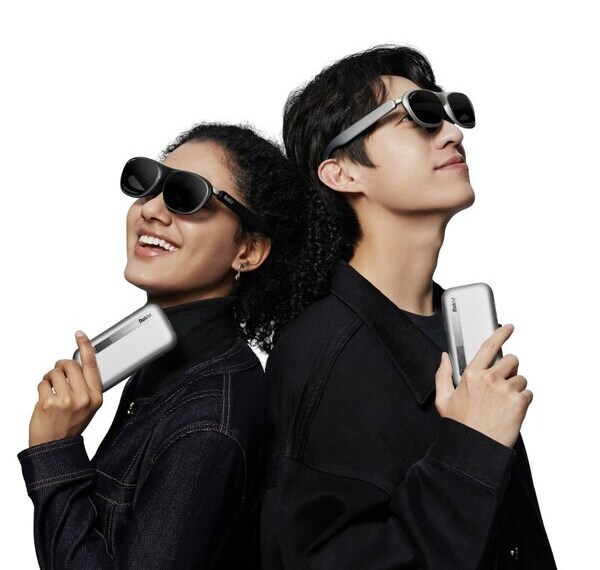Rokid’s AR Lite suite combines the Rokid Max 2 glasses and the Rokid Station 2 host unit, revolutionizing spatial computing with enhanced ergonomics and interaction
HANGZHOU, China, April 23, 2024 /PRNewswire/ — Rokid is officially unveiling the AR Lite spatial computing suite, a groundbreaking combination of the Rokid Max 2 glasses and the Rokid Station 2 host unit. This innovative pairing marks a leap forward for Rokid by blending cutting-edge hardware with enhanced user interaction through Rokid’s proprietary YodaOS-Master spatial operating system.
The Rokid AR Lite suite represents a paradigm shift in ergonomic design and human-machine interaction, departing from bulky headsets to deliver a wearable, lightweight, and user-friendly experience. Weighing a mere 75 grams, the Rokid Max 2 glasses offer a form factor akin to traditional eyewear, poised for widespread adoption.
The Rokid Station 2, powering the AR Lite suite, boasts a compact aluminum alloy frame and utilizes a Snapdragon® Platform optimized by Qualcomm Technologies, Inc. for graphics rendering and AI computing on its YodaOS-Master operating system to maximize performance. With a large 5000mAh battery and dual Type-C ports supporting 18W fast charging, the Rokid Station 2 ensures extended use and seamless entertainment consumption.
 Rokid officially unveiled the AR Lite spatial computing suite, a groundbreaking combination of the Rokid Max 2 glasses and the Rokid Station 2 host unit.
Rokid officially unveiled the AR Lite spatial computing suite, a groundbreaking combination of the Rokid Max 2 glasses and the Rokid Station 2 host unit.
The Rokid Max 2 glasses introduce a new style of industrial design, with a focus on ergonomic optimization:
Intelligent Interpupillary Distance Adjustment: Active adjustment mechanism for optimal visual clarity and comfort. Non-Destructive Diopter Adjustment: Seamless diopter adjustment capability catering to nearsighted users. Ultra-Light Air Nose Pads: 30% reduction in pressure on the nose bridge for enhanced comfort. Bendable and Soft Ergonomic Temples: Conforming to user ear contours for a snug fit and prolonged comfort.
Meanwhile, the AR Lite suite introduces innovative human-machine interaction, eliminating physical buttons on the Rokid Station 2 in favor of single, double, and triple finger touch controls. This transition facilitates seamless three-dimensional content interaction, complemented by the precision of its spatial ray pointer.
Key Upgrades Enhancing User Experience:
Multi Screen Mode: Collaborative processing and super-large screen displays up to an equivalent of a 300-inch screen. Motion Mode: Superior picture stabilization for travel scenarios, reducing motion-induced dizziness. Spatial Screen Casting: Extends multi-platform content display capabilities with an ultra-wide 32:9 display experience. Enhanced Connectivity: Supports NAS and cloud drives with 100GB of free storage and instant pairing with foldable wireless keyboards.
Rokid’s collaboration effort with Qualcomm Technologies enables Rokid to fully optimize the YodaOS-Master system in conjunction with the capabilities of the Snapdragon platform. This enables users to enjoy a longer battery life, improved thermal management, and a superior gaming performance.
To expand the AR ecosystem, Rokid has been inking strategic collaborations, offering innovative entertainment solutions for travel, home office, and entertainment. Collaborations with Hainan Airlines, Loong Air, Alibaba Cloud, Yinxiang Biji, and Qualcomm Technologies underscore Rokid’s commitment to creating a versatile and engaging AR ecosystem tailored to global user needs.
To learn more, visit https://global.rokid.com/.
About Rokid
Rokid, a product platform company founded in 2014, focuses on human-computer interaction technology. Currently, Rokid is working on the research and development of hardware and software products such as AR glasses and the YodaOS operating system.
Through the research of speech recognition, natural language processing, optical display, semiconductor platform, and hardware design, Rokid has developed a range of augmented reality (AR) solutions for consumer and business customers, including Rokid Max AR glasses and Rokid Station.
To date, the company’s products have been sold and used in over 80 countries and regions worldwide.
This content was prepared by our news partner, Cision PR Newswire. The opinions and the content published on this page are the author’s own and do not necessarily reflect the views of Siam News Network

